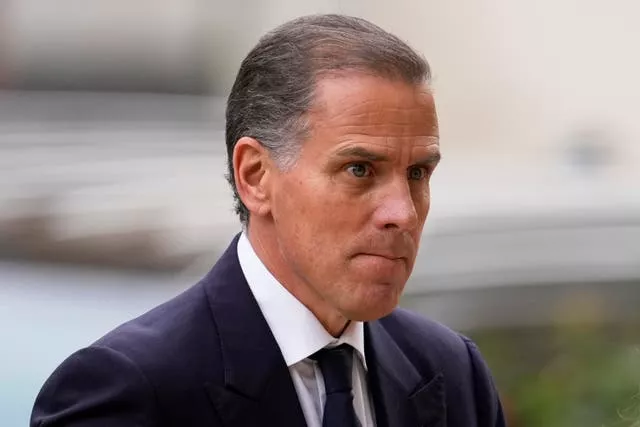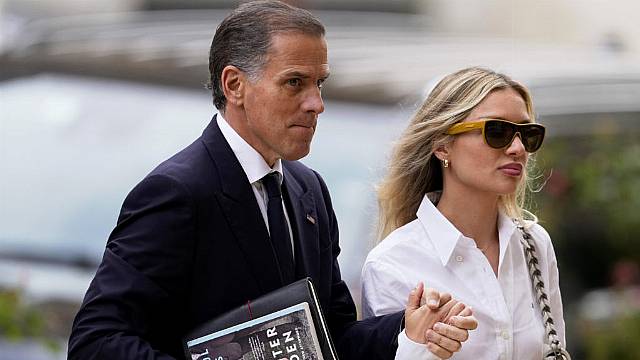The widow of Hunter Biden’s brother told jurors in his federal gun trial on Thursday about the moment she found the revolver in his truck, describing how she put it into a leather pouch, stuffed it into a shopping bag and tossed it in a rubbish bin outside a market near her home.
“I panicked, and I wanted to get rid of them,” she said about finding the gun and ammunition in the vehicle’s console in October 2018.
“I didn’t want him to hurt himself, and I didn’t want my kids to find it and hurt themselves.”

The purchase of the Colt revolver by Hunter Biden — and Hallie Biden’s frenzied disposal of it — are the fulcrum of the case against him.
Federal prosecutors say the president’s son was in the throes of a heavy crack addiction when he bought the gun.
He has been charged with three felonies: lying to a federally licensed gun dealer, making a false claim on the application by saying he was not a drug user and illegally having the gun for 11 days.
Hunter Biden, who has pleaded not guilty, has said the Justice Department is bending to political pressure from Republicans and that he is being unfairly targeted.
Ms Biden, who had a brief romantic relationship with Hunter after Beau Biden died in 2015, told the court that from the time Hunter returned to Delaware from a 2018 trip to California until she threw his gun away, she did not see him using drugs. That time period included the day he bought the weapon.
Much of her testimony focused on October 23rd 2018 — 11 days after he bought the gun and when she tossed it. Hunter was staying with her and seemed exhausted.

Asked by the prosecutor if it appeared that Hunter was using drugs around then, she said: “He could have been”.
As Hunter Biden slept in her home, Ms Biden went to check his car. She said she was hoping to help him get or stay sober, free of both alcohol and cocaine. She said she found the remnants of crack cocaine and drug paraphernalia.
She also found the gun he had purchased in a box with a broken lock that kept it from fully closing, there was ammunition too.
Ms Biden said she considered hiding the gun but thought her kids might find it, so she decided to throw it away.
“I realize it was a stupid idea now, but I was panicking,” she said.
Hunter Biden was expressionless throughout Ms Biden’s evidence.
She told jurors that she found crack at her home and saw him using it, and that she was with him occasionally when he saw dealers.
Prosecutor Leo Wise asked Ms Biden about her own 2018 trip to California, where she visited Hunter Biden at the Roosevelt Hotel, and asked her whether she was also using drugs.
“Yes, I was,” she said.

“And who introduced you to it?’”
“Hunter did,” Ms Biden said as Hunter Biden rested his face on his hand and looked down.
“It was a terrible experience that I went through, and I’m embarrassed and ashamed, and I regret that period of my life,” she added.
Ms Biden said that she stopped using drugs in August 2018, but that Hunter Biden continued smoking crack.
Much of the prosecution’s case has been dedicated to highlighting the seriousness of his crack addiction and showcasing to jurors bare-chested moments with ex-girlfriends, infidelity and crack pipes — judgment lapses they believe prove he was actively using when he checked “no” on the form.
Prosecutors argue that the evidence is necessary to show his state of mind when he bought the gun.
After Ms Biden threw the gun in the trash can at Janssen’s Market, Hunter Biden noticed it was missing and asked her whether she had taken it.
“Are you insane?” he texted. He told her to go back to the market to look for it.

Surveillance footage played for jurors showed her digging around in the rubbish bin for the gun, but it was not there. She asked store officials if someone had taken out the trash.
Ms Biden said Hunter Biden told her to file a police report because the gun was registered in his name and she called the police while she was still at the store.
The President’s son arrived at court on Thursday with a copy of his memoir, “Beautiful Things” tucked under his arm.
The book, written after he got sober in 2021, figures heavily in the prosecution’s case. They have played audio excerpts for jurors in which he details his descent into drugs and alcohol following the death of his brother from cancer in 2015.
Defence attorney Abbe Lowell has said Hunter Biden’s state of mind was different when he wrote the book than when he purchased the gun when he did not believe he had an addiction.
He has suggested that Hunter Biden might have felt he had a drinking problem at the time, but not a drug problem. Alcohol abuse does not preclude a gun purchase.
Jurors have also heard from the gun store clerk, who testified about how he walked Hunter Biden through a few options before he settled on the 900-dollar gun.
The clerk then watched as the customer filled out the firearms transaction record, a required document for the purchase of a gun, and saw him check off “no” to the question of whether he was “an unlawful user of or addicted to” marijuana, stimulants, narcotics or any other controlled substance.
“Everything he bought, he ultimately decided on,” he told jurors.

Gordon Cleveland, the former clerk at StarQuest Shooters & Survival Supply, said he saw Hunter Biden sign the form, which includes a warning about the consequences of submitting false information.
In his cross-examination on Thursday, Mr Lowell pointed out that some of the questions on the form are in the present tense, such as “are you an unlawful user of or addicted to” drugs. He has suggested Hunter Biden did not believe he had an active drug problem.
The proceedings are unfolding after the collapse of a plea deal that would have resolved the gun charge and a separate tax case and spared the Biden family the spectacle of a trial so close to the 2024 election.
The president’s sister, Valerie, was also in court on Thursday.

First lady Jill Biden spent the first part of the week there, before joining President Joe Biden in France for the anniversary of the D-Day landings.
Allies worry about the toll the proceedings will take on the president, who is deeply concerned about the health and sustained sobriety of his only living son.
If convicted, Hunter Biden faces up to 25 years in prison, though first-time offenders do not get anywhere near the maximum, and it is unclear whether the judge would give him time behind bars.
He also faces a separate trial in September on charges of failing to pay 1.4 million dollars in taxes.
The trial is playing out shortly after Donald Trump, the presumptive Republican presidential nominee, was convicted of 34 felonies in New York City.
The two criminal cases are unrelated, but their proximity underscores how the courts have taken centre stage during the 2024 campaign.







